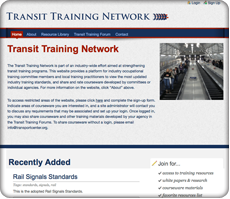News
Labor and Management Working to Strengthen Apprenticeship & Mentoring for Transit Coach Operators
Posted August 2016

“When can we find a good time to meet?” That simple question opened up a lively discussion about how labor and management need to learn how to find common ground in building a partnership that works for a transit coach operator apprenticeship program.
Deb Moy, who has served as the facilitator for the Joint Workforce Investment partnership between Valley Transit Authority and ATU Local 265 in San Jose, posed the question as part of her presentation to the August 2-4 national meeting of the Transit Coach Operator Apprenticeship Committee in Oakland, CA. Time to meet really focused on the need to bring together experienced operators willing to serve as mentors with new operators for an intense day of discussion and training. Representatives from both labor and management in Washington DC, Baltimore, the Twin Cities, Cleveland, Oakland, San Mateo County, Dallas and San Jose all responded. At least one location replied that it would be impossible to find a time that worked for all key stakeholders.
At that point, Mike Hursh, currently the General Manager at AC Transit in Oakland and formerly the Chief Operating Officer at VTA, jumped in to offer the perspective from his experience. For the union, it might mean leaning on some members to take overtime on a weekend day. The mentor training might not be your priority, but it’s important to the union. For management, it might mean that we decide to miss a route on a Sunday. That’s not ideal for service, but we decide that this training is a priority.
Hursh continued by giving another key example of building trust and working together. Coach operators sometimes had to access garages that weren’t their assigned garage. Management had insisted for years that the operator’s pass only worked at the assigned garage. “I said to others in management that you trust this operator to pull out on a route with a piece of equipment that costs three quarters of a million dollars,” said Hursh. “You trust this operator to deal in sometimes tense situations with all our customers, but you don’t trust this operator enough to allow access to a garage they don’t always use?” The policy changed.
That discussion opened up a very lively round of discussion on the need for fundamental change in the way the transit industry deals with front-line operators. A continuing theme of the meeting revolved around the need for management to see its role as supporting operators, not disciplining them. “We need to think about keeping operators on the street, not keeping them in line,” said Tom Fink, now a Center staffer and formerly a leader in ATU Local 265 who is widely credited with starting the coach operator apprenticeship program in San Jose. Several representatives from both labor and management cited Hursh’s example of opening up all facilities to operators as a genuine move toward trust.
Through the two and half day meeting, participants also reviewed and revised current industry standards for training and debated what a new competency-based format for coach operator apprenticeship would look like. Diane Jones from the Urban Institute presented the competency-based model she is developing for the US Department of Labor. The competencies are tied directly to job functions, a higher level than the task-oriented learning objectives in the standards for training. Defining exactly the needed job functions also led to some lively discussion. The group exchanged ideas on current practices for training and how to improve on them. Bus operator assaults were a particular focus of discussion with a lot of attention on how law enforcement can be involved in training operators on their rights. The model of mentoring for apprenticeship remained central through the whole meeting.
Participants of the meeting included labor and management representatives from:
Agency Partners Union Partners
AC Transit ATU Local 192
Dallas Area Rapid Transit (DART) ATU Local 1338
Greater Cleveland Regional Transit Authority (GCRTA) ATU Local 268
Maryland Transit Administration (MTA) ATU Local 1300
Metro Transit (St.Paul/Minneapolis) ATU Local 1005
San Mateo Transit Authority (SAMTRANS) ATU Local 1574
Santa Clara Valley Transit Authority (VTA) ATU Local 265
Transit Authority of River City (TARC) ATU Local 1447
Washington Metropolitan Area Transit Authority (WMATA) ATU Local 689
For more information on the Transit Coach Apprenticeship Committee contact Project Manager Tia Brown
